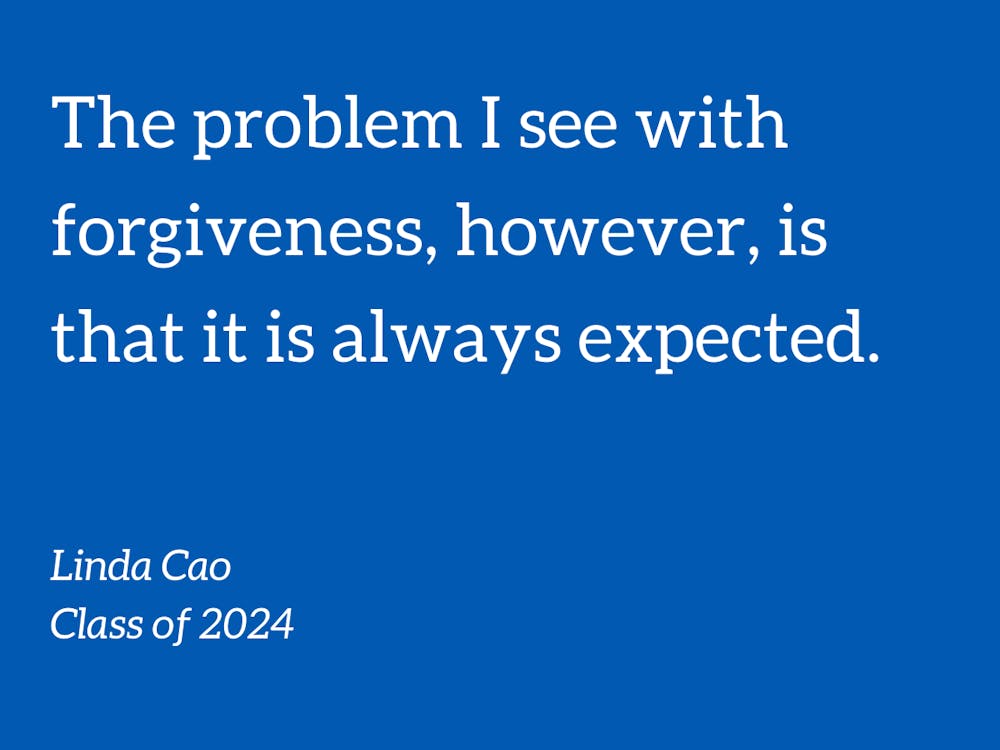Oprah Winfrey once said, “forgiveness is giving up the hope that the past could be any different.”
Well, forgive me, but I think that’s just bullshit.
Forgiveness is a dynamic concept, with a spectrum of interpretations. To Dr. Rubin Khoddam, a clinical psychologist, forgiveness means you can step into your present rather than staying anchored in the past. To the Mayo Clinic, forgiveness means to let go of resentment and thoughts of revenge. To me, and as with most people, forgiveness is acceptance.
Do not be mistaken, I am not here to preach about how everyone should be forgiven for their sins, or how we should hold hands around a campfire and share our deepest secrets. Rather, I am here to remind you to not forgive everyone.
With Thanksgiving around the corner, nearly everyone will fly back home, reuniting with family, childhood friends, the blunt (but sweet) elderly couple next door, previous schoolteachers, the creepy cashier down the road, etc. Essentially, you reunite with your past.
When at Duke, with the distance, sometimes you selectively forget parts of your past: shady boyfriends who cheated on you, toxic emotionally manipulative aunts, passive aggressive ex-best friends, and such. But, when returning home, it’s like a flood of unaddressed insecurities and suppressed rage drown you, exploiting your lungs of air.
“Goodness, remember how chubby you were when you were younger?”
Yes Auntie, you made sure I was aware of it every time I wore a remotely tight dress.
“Thank goodness you grew out of that!”
And thank you for the body dysmorphia.
When you bring up your past trauma, they casually dismiss it, as if they expect you to accept the forgiveness, wrapped in a hilarious anecdote, aimlessly thrown at your feet and move on. But why should we? Why should we be expected to move on simply because they have?
According to Dr. Schurman-Kauflin, the pressure for victims to “move on,” whether it’s coming from relatives or therapists, is to ensure that “the victim does not become fixated on the hurt because fixating freezes you.” Simply, to them, your life is not over, and forgiveness is seen as turning the key to start the engine.
The problem I see with forgiveness, however, is that it is always expected. Even in the numerous articles I’ve read, every author, physician, or professional depicts forgiveness as the ultimate destination. “You’re not ready to forgive yet,” “How to learn to forgive,” and “Why forgiveness is healthy” are some of the common titles I encountered. Forgiveness is seen as something unconditional because people make mistakes and are flawed and should always be given a chance to redeem themselves.
“Forgiveness is giving up the hope that the past could be any different.”
No, forgiveness is acknowledging the truth that the past should have been different.
Time is not an excuse to deflect or justify one’s behavior. To clarify, I am not saying that you should never forgive someone if they have wronged you. Evidently, people can have a lapse in judgement, which results in mistakes. We’ve all made stupid mistakes in life, apologized for them, and everyone moved on. However, I am referring to more serious incidents and how the decision to forgive or not forgive is entirely the victim’s prerogative. I want to emphasize that forgiveness is not an obligation. If it is in your power to do so, then I am glad you could attain closure. But people who pressure individuals to forgive their perpetrators who have abused, traumatized, or exploited them, simply because it is the morally right choice, exacerbates the individual’s emotional neglect and proves why forgiveness is sometimes not an option. In contrast to the Nancy-Meyer-fairytale-redemption scenarios, there are some words that can’t be retracted and actions that can never be forgiven.
So, what should you do if you can’t forgive someone?
If you don’t forgive them, people react as if you are condemning yourself to a life of eternal resentment. You will live your life in anger and rage; a curse society casts on us. Yet, I’d argue that it’s more complex and nuanced than simple resentment. Healing isn’t forgetting and relinquishing your past. Despite living in a monochrome society, we’re allowed to live our lives in grayscale. We can be both happy and upset; happy with the present and upset with the past.
We live our lives with indignation, with scars that have only begun to heal, promising ourselves that we will never allow another to mistreat us as others have. I used to believe that forcing myself to forgive everyone would be euphoric: the solution to my anxiety and depression. However, I realized that it is much more cathartic to live with raw sincerity than faux politeness. Be upset. Be indignant. You deserved a past that should have been different, better.
So, forgive me, but I don’t forgive you.
Linda Cao is a Trinity sophomore. Her column runs on alternate Thursdays.
Get The Chronicle straight to your inbox
Signup for our weekly newsletter. Cancel at any time.
Linda Cao is a Trinity senior and an opinion managing editor of The Chronicle's 119th volume.

